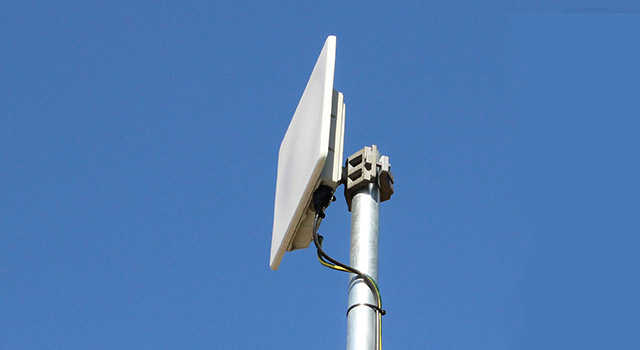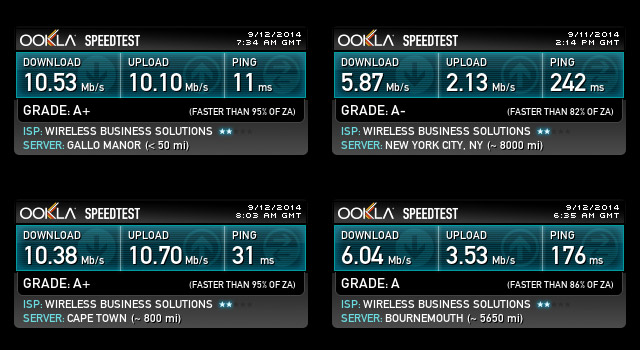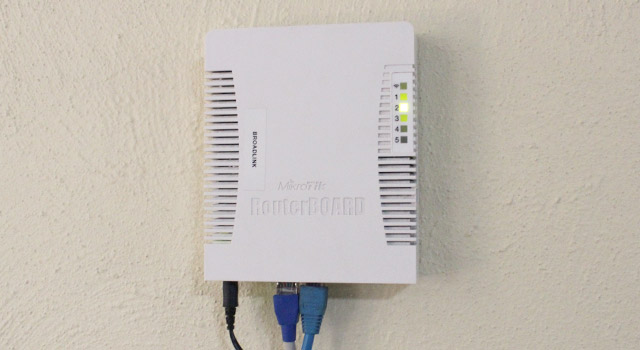
Wireless Internet service provider iBurst has launched BusinessLink, a symmetrical wireless broadband offering aimed at business users. Delivering speeds of up to 40Mbit/s on both the uplink and the downlink, BusinessLink, which was launched commercially earlier this year, does not require a fixed line to work.
But how does it fare? TechCentral has put its 10Mbit/s package through rigorous testing.
Possibly the biggest selling point of iBurst’s BusinessLink is that it’s symmetrical. This will appeal to business users that upload or stream video content and those that distribute large files or require offsite backup.
Somewhat opportunistically perhaps, iBurst is pitching the service as a replacement to Telkom’s nearly obsolete Diginet lines.
Unlike traditional leased-line connections, though, BusinessLink uses licensed microwave spectrum to connect customers to a nearby tower or other high site. From there, it connects via fibre (or sometimes microwave if no fibre backhaul is available) to iBurst’s core network. In areas where iBurst does not have infrastructure, it partners with other companies to provide the backhaul. This will attract a surcharge, though.
Because the technology requires line of sight from the installation point at the business to the high site, iBurst first needs to determine if a client’s property can be covered. Once done, it sends an installation team.
There is a nonrefundable installation fee, the price of which is determined by the package selected and the hardware required. The 5Mbit/s and 10Mbit/s options attract an installation fee of R3 500. The costs go up from there for faster packages. The hardware remains iBurst’s property, but the company swaps out faulty hardware at no additional cost.
The standard service level agreement (SLA) offers next business day support (or sooner if support engineers are available). There’s an enhanced SLA that offers 24/7 support with a four-hour mean time to repair.
During the first few weeks of testing at TechCentral’s offices — using the 10Mbit/s BusinessLink package — we experienced severe Wi-Fi interference issues not of iBurst’s doing.
The result was a much slower throughput and occasionally even a dropped connection. The company sent out a support engineer to swap out the hardware in an effort to improve the Wi-Fi experience. It also tweaked the configuration of the device and the settings on the microwave connection remotely. The connection has been stable ever since.

In TechCentral’s testing, we found the BusinessLink package performed marginally better for downstream performance than a Telkom digital subscriber line (DSL) connection syncing at the same speed. The BusinessLink connection’s latency is consistently better than DSL — surprising, given it’s wireless — and throughout our trials never exceeded 31ms on tests to local servers. In some cases, pings were as low as 11ms. Remember, lower is better.
Although international latency was considerably poorer, this was not a symptom of this service but rather the distances involved with connecting to servers around the globe. However, connection speeds for international traffic were below par. Considering the costs involved, we would have hoped to exceed the relatively slow speeds during our tests. On average, our international speed tests delivered about 6Mbit/s, well below the link’s true potential.
Where the BusinessLink excelled every time was in uploads. We could stream high-definition video without hiccups and upload files to YouTube in minutes rather than the hours it would take on ADSL.
BusinessLink offers both capped and uncapped packages. The capped offerings cost R12,49/GB. There is a fair-use policy that applies to the uncapped offerings, where connections are throttled once caps are reached. The data “soft caps” are 1,2TB for the 5Mbit/s option; 2,5TB for the 10Mbit/s; 5TB for both the 20Mbit/s and 30Mbit/s plans; and 7,5TB for the 40Mbit/s package. Once these thresholds have been reached, the 5Mbit/s connection is throttled to 2Mbit/s; the 10Mbit/s to 4Mbit/s; the 20Mbit/s to 8Mbit/s; and the 40Mbit/s to 18Mbit/s.
iBurst offers five static Internet protocol (IP) addresses on the uncapped offering and a single static IP address on the capped service. Static IPs are important for those wanting to host servers on the line or connect to services inside the firewall. Companies that use voice-over-IP services get dedicated channels with a quality-of service assurance.

Once we got over the initial hiccups, our test link worked great — especially when we hooked it up using Ethernet. However, considering the high monthly subscription fees, it’s certainly not for everyone.
Prices depend on the contract terms. A 12-month uncapped contract costs about R5 599/month for the 5Mbit/s product. The 10Mbit/s package fetches about R6 999/month, while the 20Mbit/s, 30Mbit/s and 40Mbit/s plans cost approximately R11 500/month, R15 999/month and R20 499/month respectively.
For the capped offerings, on a 12-month contract, 5Mbit/s costs about R3 000/month, 10Mbit/s R4 000/month, 20Mbit/s R7 000/month, 30Mbit/s cost R10 000/month and 40Mbit/s R14 300.
The packages offer a lower contention ratio (10:1) than many other services. This means connectivity shouldn’t be adversely affected when there’s heavy demand on iBurst’s network.
For businesses that don’t have access to other broadband options, or that require 20Mbit/s or 40Mbit/s connectivity and don’t have access to fixed lines that offer such speeds, the BusinessLink plans are worth considering. Although expensive and certainly not intended for home users, businesses that need symmetrical, high-availability broadband will be glad there’s another option to choose from. — (c) 2014 NewsCentral Media




